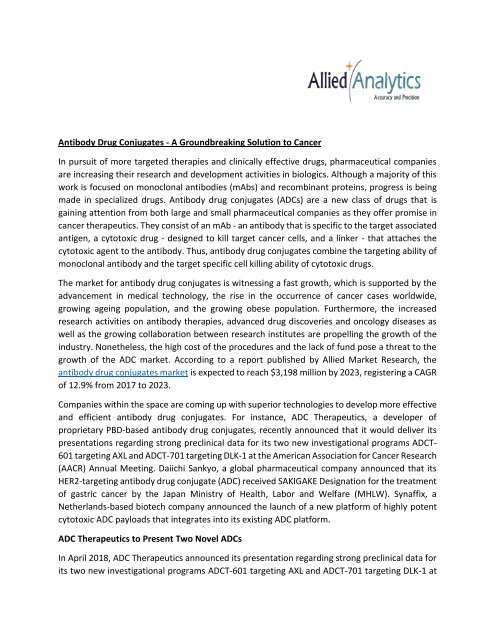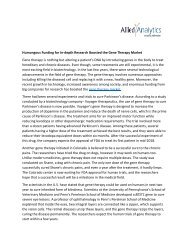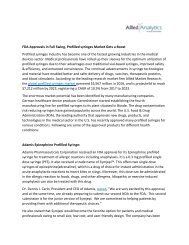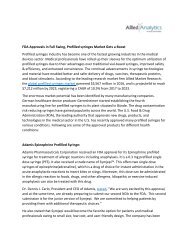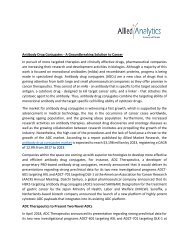Antibody Drug Conjugates Market: Groundbreaking Solution to Cancer
Antibody drug conjugates are highly effective biopharmaceutical medications designed as a targeted therapy for cancer treatment. Globally, in 2012 there were around 14.1 million cancer cases reported as per the data provided by the Cancer Research UK. The antibody drug conjugate market exhibits massive potential in the near future owing to the increase in prevalence of cancer across geographies. The preparation process of ADC’s involves great difficulty, inspite of these hurdles recently approved ADC’s have proved their worth for treatment of cancer. Thus, there is a strong pipeline of ADC’s that promises revolutionary changes in area of targeted therapy for cancer treatment.
Antibody drug conjugates are highly effective biopharmaceutical medications designed as a targeted therapy for cancer treatment. Globally, in 2012 there were around 14.1 million cancer cases reported as per the data provided by the Cancer Research UK. The antibody drug conjugate market exhibits massive potential in the near future owing to the increase in prevalence of cancer across geographies. The preparation process of ADC’s involves great difficulty, inspite of these hurdles recently approved ADC’s have proved their worth for treatment of cancer. Thus, there is a strong pipeline of ADC’s that promises revolutionary changes in area of targeted therapy for cancer treatment.
Create successful ePaper yourself
Turn your PDF publications into a flip-book with our unique Google optimized e-Paper software.
<strong>Antibody</strong> <strong>Drug</strong> <strong>Conjugates</strong> - A <strong>Groundbreaking</strong> <strong>Solution</strong> <strong>to</strong> <strong>Cancer</strong><br />
In pursuit of more targeted therapies and clinically effective drugs, pharmaceutical companies<br />
are increasing their research and development activities in biologics. Although a majority of this<br />
work is focused on monoclonal antibodies (mAbs) and recombinant proteins, progress is being<br />
made in specialized drugs. <strong>Antibody</strong> drug conjugates (ADCs) are a new class of drugs that is<br />
gaining attention from both large and small pharmaceutical companies as they offer promise in<br />
cancer therapeutics. They consist of an mAb - an antibody that is specific <strong>to</strong> the target associated<br />
antigen, a cy<strong>to</strong><strong>to</strong>xic drug - designed <strong>to</strong> kill target cancer cells, and a linker - that attaches the<br />
cy<strong>to</strong><strong>to</strong>xic agent <strong>to</strong> the antibody. Thus, antibody drug conjugates combine the targeting ability of<br />
monoclonal antibody and the target specific cell killing ability of cy<strong>to</strong><strong>to</strong>xic drugs.<br />
The market for antibody drug conjugates is witnessing a fast growth, which is supported by the<br />
advancement in medical technology, the rise in the occurrence of cancer cases worldwide,<br />
growing ageing population, and the growing obese population. Furthermore, the increased<br />
research activities on antibody therapies, advanced drug discoveries and oncology diseases as<br />
well as the growing collaboration between research institutes are propelling the growth of the<br />
industry. Nonetheless, the high cost of the procedures and the lack of fund pose a threat <strong>to</strong> the<br />
growth of the ADC market. According <strong>to</strong> a report published by Allied <strong>Market</strong> Research, the<br />
antibody drug conjugates market is expected <strong>to</strong> reach $3,198 million by 2023, registering a CAGR<br />
of 12.9% from 2017 <strong>to</strong> 2023.<br />
Companies within the space are coming up with superior technologies <strong>to</strong> develop more effective<br />
and efficient antibody drug conjugates. For instance, ADC Therapeutics, a developer of<br />
proprietary PBD-based antibody drug conjugates, recently announced that it would deliver its<br />
presentations regarding strong preclinical data for its two new investigational programs ADCT-<br />
601 targeting AXL and ADCT-701 targeting DLK-1 at the American Association for <strong>Cancer</strong> Research<br />
(AACR) Annual Meeting. Daiichi Sankyo, a global pharmaceutical company announced that its<br />
HER2-targeting antibody drug conjugate (ADC) received SAKIGAKE Designation for the treatment<br />
of gastric cancer by the Japan Ministry of Health, Labor and Welfare (MHLW). Synaffix, a<br />
Netherlands-based biotech company announced the launch of a new platform of highly potent<br />
cy<strong>to</strong><strong>to</strong>xic ADC payloads that integrates in<strong>to</strong> its existing ADC platform.<br />
ADC Therapeutics <strong>to</strong> Present Two Novel ADCs<br />
In April 2018, ADC Therapeutics announced its presentation regarding strong preclinical data for<br />
its two new investigational programs ADCT-601 targeting AXL and ADCT-701 targeting DLK-1 at
the American Association for <strong>Cancer</strong> Research (AACR) Annual Meeting which takes place from<br />
April 14-18, 2018 in Chicago, USA. Dr. Jay Feingold, Chief Medical Officer and Senior Vice<br />
President of Clinical Development at ADCT said, “Our two new investigational programs show<br />
compelling efficacy and safety in preclinical studies. These results provide an important step <strong>to</strong><br />
advance ADCT-601 and ADCT-701 in<strong>to</strong> the clinic and enlarge our pipeline of PBD-based ADCs in<br />
multiple ongoing clinical trials for the treatment of both solid and hema<strong>to</strong>logical cancers.”<br />
Highlights of the data <strong>to</strong> be presented are available on the AACR conference website at<br />
www.aacr.org<br />
Daiichi Sankyo's HER2-Targeting <strong>Antibody</strong> <strong>Drug</strong> Conjugate Receives SAKIGAKE Designation for<br />
Gastric <strong>Cancer</strong><br />
In March 2018, Daiichi Sankyo announced that DS-8201, an HER2-targeting antibody drug<br />
conjugate (ADC) received SAKIGAKE Designation for the treatment of HER2-positive advanced<br />
gastric or gastroesophageal junction cancer by the Japan Ministry of Health, Labor, and Welfare<br />
(MHLW). The company said that it intends <strong>to</strong> work closely with the Japan MHLW under the terms<br />
of the SAKIGAKE program <strong>to</strong> speed up the development of DS-8201 since Japan has one of the<br />
highest cases of gastric cancer worldwide. The SAKIGAKE Designation system fosters R&D in<br />
Japan, propelling early practical application for novel pharmaceutical products, medical devices,<br />
and regenerative medicines. As a designated medicine under the system, DS-8201 has prioritized<br />
consultation, a dedicated review system <strong>to</strong> support the development and review process, and a<br />
reduced review time.<br />
Synaffix Launches <strong>to</strong>xSYN, a New Platform of ADC Payloads<br />
Synaffix BV, a biotechnology company announced thgrowinge launch of a new platform of<br />
cy<strong>to</strong><strong>to</strong>xic ADC payloads that integrates in<strong>to</strong> its current ADC platform. With the launch, the<br />
company becomes a provider of technologies needed <strong>to</strong> quickly translate antibodies in<strong>to</strong><br />
proprietary ADC products. The new <strong>to</strong>xSYN platform comprises four highly potent payloads<br />
offering multiple mechanisms of action and a way for commercialization when integrated with<br />
the components of Synaffix’s GlycoConnect and HydraSpace technologies. Validated clinically<br />
with well-known efficacy and safety profiles, the payloads were selected <strong>to</strong> address the two types<br />
of biologies that exist across ADC targets such as rapidly-dividing cancer cells and quiescent cells.<br />
“We expect this important expansion of our ADC technology <strong>to</strong> further advance our internal<br />
research and facilitate collaborations with a much broader set of companies,” said Peter van de<br />
Sande, CEO of Synaffix. “By providing these four distinct payloads through our new <strong>to</strong>xSYN<br />
platform, we can now enable any company with an existing antibody <strong>to</strong> rapidly establish a highlycompetitive<br />
clinical-stage ADC program for its own development pipeline.”<br />
Read more at: https://www.alliedmarketresearch.com/antibody-drug-caonjugate-market


